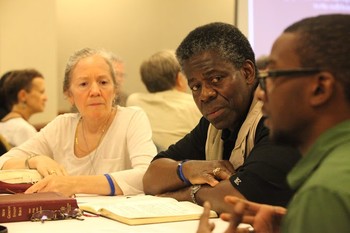About 20 people tried out an abbreviated version of a new Presbyterian study of marriage in one workshop offered at Big Tent. Attendance doubled at a second workshop, which focused on how to introduce and use the marriage study in presbyteries and congregations.
Participants arrived at both workshops — sponsored by the Theology, Worship, and Education Conference — aware of painful divisions in the church over same-sex relationships and of the rapidly changing legal landscape surrounding marriage. They left with some unexpected insights.
The Rev. Charles Wiley, coordinator of the PC(USA)’s Office of Theology and Worship, led the second marriage workshop. He said he heard one person comment that before doing the study, he had never thought about marriage as an aid to Christian discipleship.
“It really hadn’t occurred to him that marriage was a new way of life for two people called to live their Christian faith together,” Wiley said.
Other participants wondered why the Presbyterian Church isn’t doing more to support and strengthen marriages in light of the high divorce rate in the United States.
Workshop leader the Rev. Chip Hardwick, the PC(USA)’s director of Theology, Worship, and Education, said the marriage study is not an academic treatise or position paper but “a curriculum, a study guide to help congregations discern how the spirit is leading them on marriage.”
The study was developed by the theology and worship office in response to a referral by the 220th General Assembly (2012). It gives a theological and historical overview of the church’s understanding of Christian marriage using confessional documents and the Book of Order.
The study is available in a two-hour version (an introductory tool that could be used at a presbytery meeting) and a six-session version (the recommended version for congregations and presbyteries).
One goal of the study, Hardwick said, is to “develop a common language for speaking about marriage” — a language based on theology and Scripture rather than on descriptions of marriage found in popular culture.
Another goal is to gain “a clearer view of God’s will for us in marriage,” Hardwick said, “and maybe not consensus, but a better understanding of others’ points of view.”
“We’re not trying to change people’s minds,” Wiley said. “We’re trying to get people to go deeper in their beliefs.”
Wiley and Hardwick both stressed the importance of building trust and an atmosphere of respectful listening among study participants. Leaders of the study don’t necessarily need prior expertise in the subject matter, but they should be willing to do the background reading, Wiley said. “We don’t need to share our ignorance.”
Both versions of the marriage study and other resources on marriage are available at www.pcusa.org/marriage.
Big Tent, Aug. 1-3, was a celebration of Presbyterian Church (U.S.A.) mission and ministry organized around the theme “Putting God’s First Things First.” It was composed of 10 national Presbyterian conferences, more than 160 workshops and special events to mark the 30th anniversary of the formation of the PC(USA) and the 25th anniversary of the opening of the Presbyterian Center here.

